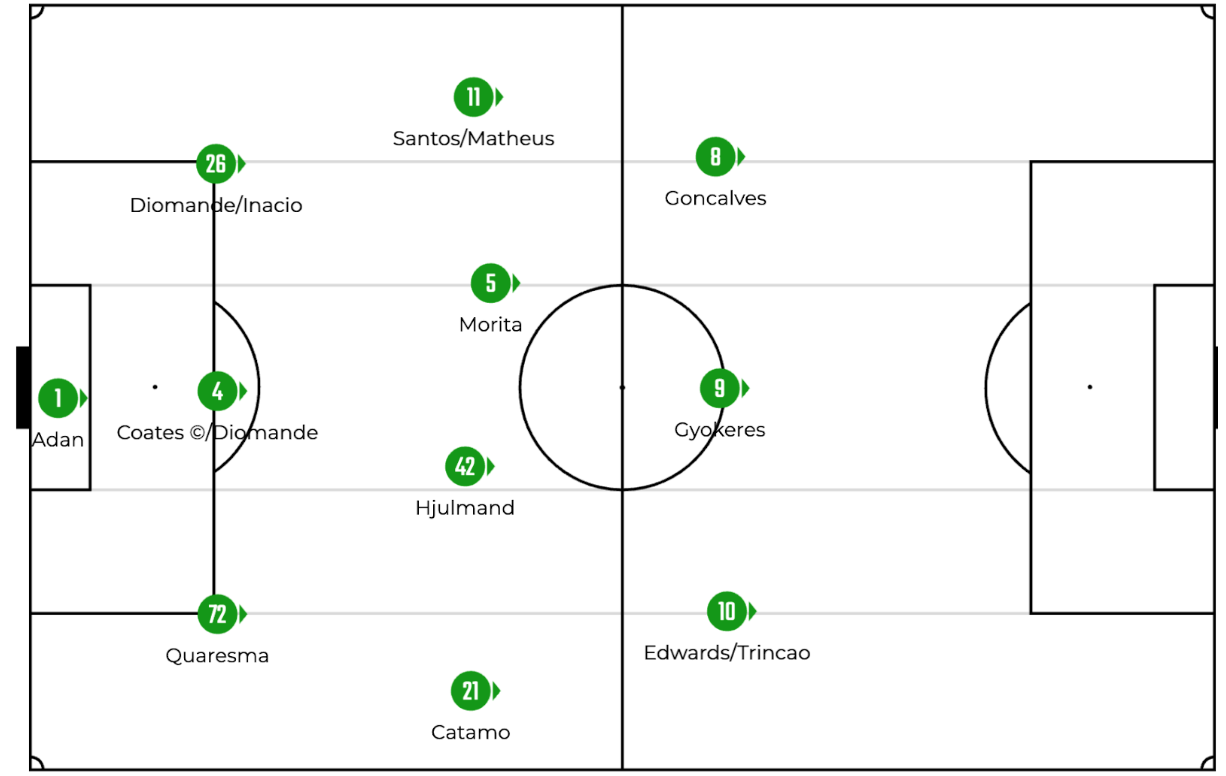
Arsenal’s impressive victory over Manchester United and Sporting CP’s unexpected loss reveal how tactical decisions can shape match outcomes. While Arsenal capitalized on set-pieces with flair, they did so without Gabriel, a key defender. On the flip side, Ruben Amorim faced consequences after rotating his forwards, leading to their first defeat. Let’s explore how these strategies unfolded in each team’s performance.
Arsenal’s Set-Piece Dominance: A Tactical Masterclass
Arsenal’s Set-Piece Strategy: Detailed Breakdown of Tactics and Execution
Arsenal has built a reputation for their set-piece efficiency this season, and it’s paying off. Here’s a look at their current stats:
- Total set-piece goals: 12
- Success rate: 65%
- Goals scored with Gabriel: 8
- Goals scored without Gabriel: 4
Comparing these numbers shows a slight dip in efficiency without Gabriel, but the team has adapted remarkably. Mikel Arteta’s coaching shines through in well-drilled routines, showcasing the squad’s preparation and execution.
The Impact of Gabriel’s Absence: Did Arsenal Miss Him?

Despite concerns about lacking Gabriel, the Gunners managed effectively. They altered their defensive setup, relying more on players like Saliba and Gabriel Jesus to fill the void. Key takeaways include:
- Defensive performance: The alternative setup maintained solid organization.
- Aerial duels won: 58% without Gabriel compared to 65% with him.
Although Gabriel’s physical presence was missed, Arsenal proved they could adapt and thrive.
Key Players’ Contributions: Highlighting Individual Performances
Several players stepped up in Gabriel’s absence:
- Bukayo Saka: Delivered pinpoint corners that led to goals.
- Martin Ødegaard: Frequently involved in creating set-piece opportunities.
- William Saliba: Contributed defensively and offensively in set-piece scenarios.
Statistical highlights include Saka’s three assists from set-pieces and Saliba winning 75% of aerial duels.
Sporting CP’s Forward Rotation: A Calculated Risk That Backfired

Amorim’s Rotation Strategy: Examining the Tactical Decision
Ruben Amorim’s decision to rotate forwards seemed strategic but proved detrimental. He aimed to manage fatigue and maintain freshness, yet it disrupted team chemistry. Here are some considerations:
- Strengths of rotated forwards: Varied skill sets but lack of collaboration.
- Weaknesses: Inconsistency in attacking fluidity.
The outcome reflected the need for a cohesive unit, especially against high-caliber teams like Manchester United.
The Impact on Sporting’s Offensive Performance: Analysis of Goalscoring Opportunities
Sporting CP struggled offensively, particularly in the crucial match:
- Shots on target: 4 in the loss compared to 12 in earlier matches.
- Possession: Dropped to 45%, impacting their ability to create chances.
Post-match analysis highlighted how the rotation affected their attacking rhythm.
Lessons Learned: Evaluating the Long-Term Consequences
Amorim’s choice to rotate forwards might have backfired, causing potential long-term repercussions:
- Team morale: Confidence may suffer after a significant loss.
- Player trust: Rotation could lead to uncertainties about starting positions.
Adapting future squad management strategies will be essential.
Comparing Arsenal and Sporting CP: Contrasting Approaches to Squad Management

Tactical Flexibility vs. Consistency: A Comparative Analysis
Both Arsenal and Sporting CP displayed differing philosophies in squad management:
- Arsenal: Focused on consistency, allowing players to build relationships on the field.
- Sporting CP: Emphasized flexibility, which may come with risks in cohesion.
Each method has merits and drawbacks, reflecting the importance of finding an optimal balance.
The Role of Coaching: Impact of Managerial Decisions
Mikel Arteta and Ruben Amorim showcase different managerial styles that impact their teams:
- Arteta’s strategy: Consistent formation with emphasis on set-pieces.
- Amorim’s method: Frequent rotations aiming for freshness but risking cohesion.
Their decision-making processes in leading up to games define their success on the pitch.
Key Takeaways and Future Implications
Arsenal’s Set-Piece Strength: A Sustainable Advantage?
Arsenal’s mastery of set-pieces indicates sustainable success, yet challenges lie ahead:
- Counter-strategies: Opponents may prepare focused defenses against their set-pieces.
- Future predictions: Continued emphasis on set-pieces could yield further benefits.
Sporting CP’s Forward Rotation: A Learning Experience?
Sporting CP may need to adjust their approach after recent lessons:
- Future adaptations: A return to a more stable forward line could enhance performance.
- Predictions for future matches: Regaining offensive fluidity will be crucial for upcoming games.
Conclusion: Lessons Learned from Two Contrasting Matches
Recent match outcomes for Arsenal and Sporting CP shed light on essential football strategies. Arsenal’s effective set-pieces and ability to adapt without Gabriel highlight the importance of tactical flexibility. Conversely, Sporting CP’s struggle to find rhythm after forward rotations illustrates the necessity of maintaining consistency. Understanding these dynamics is key for future success in football.


